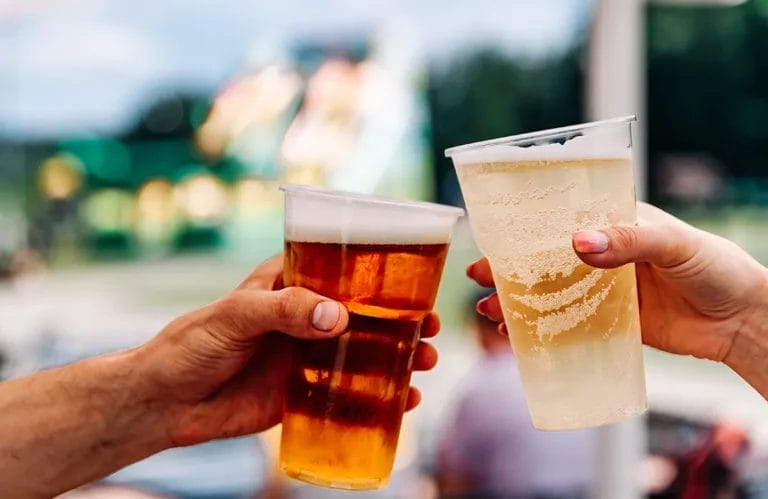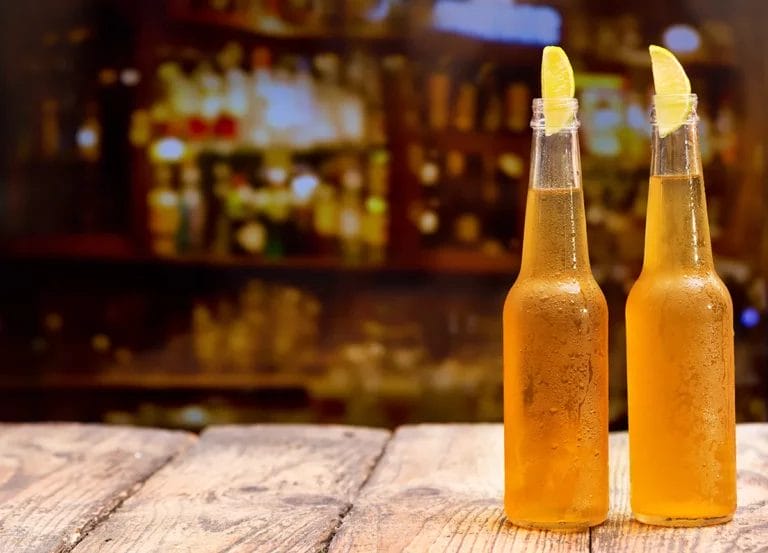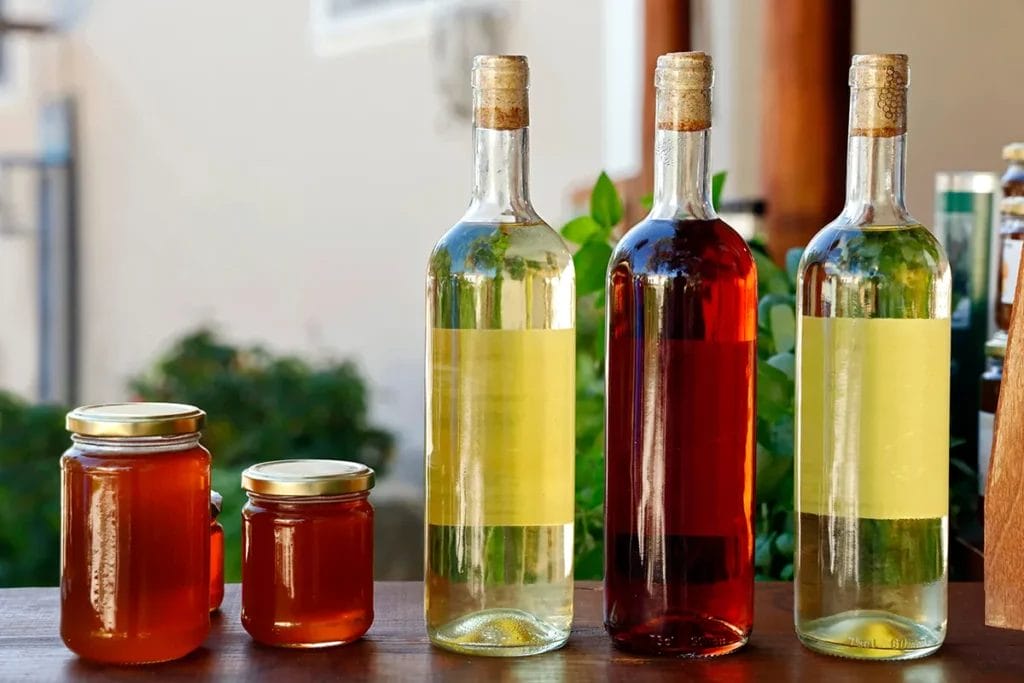Last Updated: February 14, 2025 by Alex Hastings
With higher profit margins than food and other beverages, many food vendors are drawn to expanding their menus to include alcoholic drinks. It only takes a few curious Google searches to reveal that there’s more to learning how to sell alcohol as a food vendor than deciding whether to offer cocktails or stick to a beer and wine menu.
Fortunately, we’ve done the hard work for you! From meeting legal requirements and getting your liquor license to insuring your business and getting ready to sell, we’ve got you covered.
Sell Alcohol Legally With These Requirements
To sell alcohol legally in the United States, you must meet the following requirements. Keep in mind, the details for each of these requirements vary from state to state, so consult your state’s Department of Alcoholic Beverage Control.
Meet Minimum Age Requirements
Each state has laws determining the minimum age for selling and/or serving alcohol. The minimum age typically ranges from 18 to 21. If you have employees who aren’t old enough to drink legally, they may need to be supervised by someone over 21.
Obtain a Liquor License
This license is issued by the Department of Alcoholic Beverage Control in your state. There are additional requirements your business must meet before your local control board will grant you a license.
Adhere to Licensing Restrictions
Depending on your state and the type of alcohol license you have, you may be limited to selling certain types of alcoholic beverages, such as beer and wine.
There may be laws in your area that prohibit alcohol sales on specific days of the week or during certain times of day. New Jersey, North Carolina, and Utah are among the states with the strictest restrictions on selling alcohol.
Hire Trained Staff to Serve Alcohol
20 states require employees to take a course on responsible serving practices and pass an exam before they are legally allowed to serve alcohol, and 23 states incentivize it. Ensure your team completes a state-approved course through Training for Intervention Procedures (TIPS).
How to Get Your Permit to Sell Alcohol
Getting your alcohol permit involves several steps, which can take anywhere from 40 days to six months. While exact requirements vary depending on your state, here’s a general list of what you’ll need to do.
Determine What Kind of Permit You Need
State alcohol boards issue different permits depending on the kinds of alcohol you plan to sell and the type of business you run. A food truck selling beer and wine needs a different kind of permit than a caterer who offers full bar service.
If you don’t plan to sell alcohol year-round and only want to serve drinks at an event, you may only need a special event permit. This allows you to sell certain alcoholic beverages at a specified time, date, and place.
Identify if You Live in a Quota State
Some states cap the number of active liquor licenses, usually based on the population of a particular area. This helps prevent too many bars or alcohol-serving establishments in any given place, which could contribute to excessive drinking.
If you live in one of the following states, your alcoholic beverage control board has put a quota on the number of licenses, so ask them if there are any available before you apply:
- Alaska
- Arizona
- Florida
- Idaho
- Kentucky
- Massachusetts
- Michigan
- Minnesota
- Montana
- New Jersey
- New Mexico
- Ohio
- Pennsylvania
- South Dakota
- Utah
- Washington
Set Your Budget for Your Permit to Sell Alcohol
The cost of a liquor license depends on where you live and what types of alcohol you sell, but in some states, they can be quite costly. The price varies from as little as $100 to a whopping $40,000.
If you live in one of the quota states mentioned above, you may be facing an even higher price tag due to limited supply and high demand.
Contact Your State’s Alcoholic Beverage Control Board
Regardless of where your business operates, your alcohol board requires you to provide documents and licenses when you apply for your permit, including:
- Your Employer Identification Number (EIN)
- A zoning permit proving you are allowed to sell alcohol in the area(s) you operate
- A sales tax permit demonstrating you are legally allowed to collect and remit sales tax
- A background check showing your personal and criminal history
- TIPS or other state-approved server training certification
Submit Your Application

Risks and Benefits of Selling Alcohol
Before you start selling alcohol, weigh the pros and cons to gain a realistic understanding of what this exciting new endeavor means for your business.
Explore the Benefits
- Attract more customers: With 62% of adults in the U.S. reporting they drink alcohol, bring more customers to your food business who are looking to grab a bite to eat and enjoy a drink.
- Increased profits: A bar’s average net margin is between 10–15%, compared with 3–5% for restaurants. Alcohol is expensive to purchase upfront, but the markup for drinks can make it worth your while.
- Upselling opportunities: Try pairing drinks with existing menu items to encourage customers to try both. For example, if you serve wine, include blurbs on your menu recommending different types of wine for various dishes.
- Competitive advantage: If your food truck is one of few in your area selling alcohol, that gives you a huge leg up on the competition. When customers want food and an alcoholic beverage, you’re a one-stop shop.
- Add to your brand: Many businesses see selling alcohol as an opportunity to expand their existing brand further by creating signature cocktails or carefully curating a selection of local beers and wines.
Understand the Risks
- Selling to an underage customer: If you (and your staff) aren’t careful, you could mistakenly serve alcohol to a minor. Whether you didn’t check their ID, were handed a convincing fake, or accidentally served someone the wrong drink, it can happen to anyone in the alcohol business.
- Overserving a patron: Serving someone too many drinks can lead to belligerent behavior, property damage, car accidents, injuries, and even death.
- Damage to your reputation: Serving alcohol to a minor or overserving someone can negatively affect your business’ reputation and lead to negative publicity. This can lead to a loss of trust from your customers and the community as a whole.
- Violating legal requirements: If you are caught violating local liquor laws accidentally or intentionally, you face serious consequences. These include expensive fines, license suspension, or license revocation entirely.
- Liability risks: 42 states and the District of Columbia have dram shop laws, which hold people and businesses liable for injuries, property damage, or death caused by an intoxicated customer. Even when a bartender or server isn’t the person who caused these incidents, they can still be held liable to pay for the damages.
Why You Need Alcohol Insurance
As you now know, there are many risks to serving alcohol — which have the potential to be financially harmful to your business. The good news is alcohol business insurance can protect you from paying out of pocket for costs you’re deemed responsible for.
Alcohol-related claims are often expensive, costing anywhere from tens of thousands to millions of dollars. These claims are also not covered by a standard general liability policy.
Alcohol insurance, otherwise known as liquor liability insurance, is designed to respond to those claims and mitigate (or eliminate) associated costs, including:
- Medical bills
- Funerary costs
- Repairs to damaged property
- Replacements for damaged property
- Legal expenses (attorney’s fees, court costs, settlements, etc.)
Protect your business with a liquor liability policy from Food Liability Insurance Program (FLIP) starting at $300 per year, or $100 for a 1–3 day event. If you don’t already have a general liability policy, you can also bundle general and liquor liability starting at $37.75 a month or $453 a year.
Accidents happen. When they involve alcohol, they can place a huge financial burden on your business. Protect your new venture and get your free liquor liability quote from FLIP today!
How to Start Selling Alcohol
You got your liquor license(s), you weighed the benefits and risks, and now it’s time to earn some alcoholic beverage sales! Here are a few tips to get the (high) ball rolling and set you up for success.
Get the Gear
To sell alcohol, you must purchase some equipment you may not already have. This includes, but isn’t limited to:
- Bottle coolers and drink refrigerators
- Wine racks
- Beer taps and keg systems
- Keg coolers
- Soda guns
- Liquor dispensers
- Bar mats
- ID scanners
These costs can add up quickly, so consider buying secondhand equipment when possible.
Find Alcohol Suppliers
Just like you source your ingredients, you also need to source your beer, wine, and/or liquor from reputable suppliers.
One crucial thing to note is that some states are considered control states, meaning their government controls the sale or distribution of distilled spirits, wine, and/or beer. If you live in a control state, you will typically be required to purchase your alcohol from state-operated stores or warehouses.
If you don’t live in a control state, use these tips to identify a good supplier:
- Check out websites like the National Beer Wholesalers Association (NBWA) or the Wine & Spirits Wholesalers of America (WSWA) for robust lists of distributors
- Attend trade shows to meet suppliers in person and sample their products before committing to putting them on your menu
- Browse online platforms and digital marketplaces like Provi or SevenFifty, which allow you to view and order products from a variety of distributors
- Get recommendations from others in the industry by joining bar and restaurant Facebook groups such as Mobile Bar Community and Mobile Bev Pros, or talking to your peers in the food and beverage sphere
Carefully Curate Your Menu
No matter what type(s) of alcohol you have a license to sell, it’s essential to be selective when deciding which brands and varieties you offer customers. The amount of thought you put into choosing what goes on your menu will come across to your customers and boost your brand identity.
Part of your alcoholic beverage menu creation could include:
- Shining a spotlight on local businesses: Consumers are thirsty for local beer and wine options when ordering a drink. Connect with breweries and wineries in your area to serve drinks made right in your community
- Developing signature cocktails: Offering drinks that people can only get if they visit your business is a smart way to set yourself apart from the competition and create a fun, fresh experience
- Offering a seasonal selection: Whether you add a drink with seasonal flavors to your menu for a limited time or create a rotation of local beers and wines throughout the year, changing your menu occasionally keeps customers intrigued. Keep a couple of staples on your menu for the change-resistant folks, though!
Price Your Drinks
Carefully pricing your alcoholic beverages is key to turning a profit and making it worth your investment.
Keep these tips in mind as you decide what to charge for each drink:
- Choose a solid pricing strategy like you did with your food menu items to account for the cost of ingredients and labor, as well as your desired profit margins
- Analyze the market to learn what your competitors are charging; don’t base your prices solely on theirs, but get an idea of how much your customers expect to pay for a drink
- Understand the alcohol taxes in your state and factor them into your pricing strategy

Promote Your New Alcoholic Beverage Options
Spread the word about your new menu offerings! However, be mindful of the laws surrounding alcoholic beverage advertising in the U.S.
The Alcohol and Tobacco Tax and Trade Bureau has a list of regulations that determine what details you need to include in your advertisements.
As far as marketing strategies go, here are a few to try:
- Offer happy hour specials or special discounts: Running special promotions helps get folks interested in ordering off your new drink menu (unless you live in a control state, where this is illegal). Happy hour is a classic, but you can also try bundle discounts by pairing drinks with different menu items for a limited-time lower price.
- Create a series of “staff picks”: Let your employees choose a favorite drink from your menu to highlight throughout the year. Have whoever picks the drink write a brief description about why they like it, which you can post on social media and build hype around different options.
- Educate customers on your offerings: Today’s customers appreciate transparency, which is why giving them more than just the name of the drink is an excellent way to increase sales and promote different beverages. Add descriptions to your menu with details on where the drink is from, how it tastes, and what it pairs well with.
- Partner with local suppliers to host an event: If you add craft beers from a nearby brewery to your drink menu, work with them to host an event that highlights your food and their beverages.
Practice Risk Prevention
While accidents can still happen to even the most prepared businesses, implementing risk prevention strategies into your daily operations can greatly decrease your chance of disaster.
Some top methods include:
- Establish strict procedures for checking IDs and use ID scanners to reduce the chance of a high-quality fake ID sneaking by
- Place limits on the number of drinks per customer within a certain amount of time
- Require TIPS or another state-approved training for all employees serving alcohol
- Recognize signs of intoxication to avoid overserving customers
- Offer mocktails or non-alcoholic versions of your signature cocktails
FAQs About Selling Alcohol
Can You Sell Alcohol at a Farmers Market?
Some states, including Washington, Pennsylvania, and Oregon, allow farmers market vendors to sell alcohol. However, each state has its own requirements that vendors must meet to legally sell alcohol.
Generally, this involves acquiring permits and liquor licenses, but in some states like Washington, it also means vendors can only sell alcohol made with ingredients grown in that state. If you plan to serve or offer samples of alcohol, that usually requires an additional permit (if it’s allowed in your state).
Can You Sell Alcohol at a Private Event?
Yes, some states, including California and Texas, allow vendors to sell alcohol at private events. You typically need a special event permit or temporary liquor license.
How Do I Manage Alcohol Inventory and Reduce Waste?
- Audit your inventory on a weekly or bi-weekly basis and compare it with your sales numbers
- Use a point-of-sale (POS) system that has an integrated inventory management feature
- Refer to previous sales data to predict demand and prevent ordering more alcohol than you can reasonably sell
- Always use jiggers or pour spouts to accurately measure servings and avoid overpouring
- Adhere to the First-In, First-Out (FIFO) method to make sure your oldest stock is always used first
- Store alcohol properly in a cool location away from sunlight to preserve its quality

Kyle Jude
Kyle Jude is the Program Manager for Food Liability Insurance Program (FLIP). As a dedicated program manager with 10+ years of experience in the insurance industry, Kyle offers insight into different coverages for food and beverage business professionals who are looking to navigate business liability insurance.
Kyle Jude is the Program Manager for Food Liability Insurance Program (FLIP). As a dedicated program manager with 10+ years of experience in the insurance industry, Kyle offers insight into different coverages for food and beverage business professionals who are looking to navigate business liability insurance.

Alex Hastings
Seattle-based copywriter and (WA) licensed insurance agent Alex Hastings leverages her experience as a lover of fast-casual food, baked goods, and iced oat milk lattes. She holds a B.A. in Creative Writing from Western Washington University. Before working at Veracity, she was a retail copywriter at Zulily and an English language teacher in South Korea. Alex is fully trained on FLIP insurance coverages and writes content that connects food and beverage business owners with the policies they need.
Seattle-based copywriter and (WA) licensed insurance agent Alex Hastings leverages her experience as a lover of fast-casual food, baked goods, and iced oat milk lattes. She holds a B.A. in Creative Writing from Western Washington University. Before working at Veracity, she was a retail copywriter at Zulily and an English language teacher in South Korea. Alex is fully trained on FLIP insurance coverages and writes content that connects food and beverage business owners with the policies they need.


